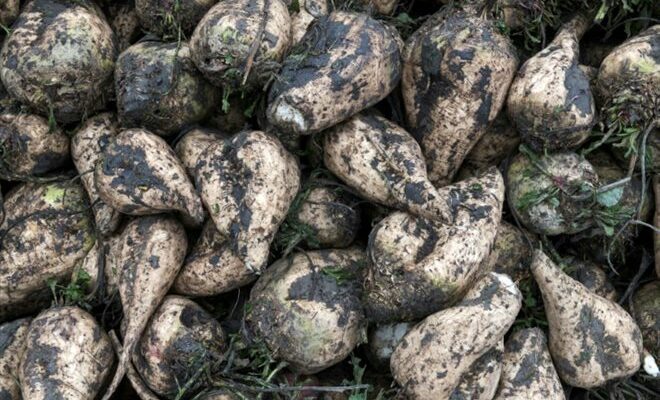The sugar producer Tereos has announced the closure of a sugar refinery and a distillery, which could lead to the elimination of 149 jobs (AFP/Archives/PHILIPPE HUGUEN)
New blow in the world of sugar: the giant Tereos announced on Wednesday the closure of a sugar refinery and a distillery, which could lead to the elimination of 149 positions, as part of a project to “reorganize its activity industry in France.
On February 8, beet growers marched with 500 tractors in Paris to protest against the total ban on neonicotinoids, insecticides harmful to bees used by way of derogation in France to protect beet seeds against the jaundice virus. They were worried about the repercussions of this decision “throughout the industry”.
A month later, and despite a sharp rise in the price of sugar, alcohol and ethanol which boosted its sales in the last quarter of 2022 (+34%), Tereos, the world’s second largest producer of sugar made from beetroot (Béghin Say), justifies its decision to close two sites by “a lasting reduction” in the production of these roots in 2023-24.
Faced with these difficulties and “the challenges of decarbonization and modernization of its infrastructures”, the group has therefore decided to stop the sugar activity of the site of Escaudoeuvres in the North (123 positions) and of its distillery of Morains in the Marne (26 positions), he said in a press release.
Tereos, which has gone through a serious governance crisis in recent years, warned at the end of February that it expected an increase in its net debt due to rising commodity and energy prices.
The management of Tereos France, which announced this closure project on Wednesday to the representatives of the personnel concerned, said it wanted to favor a reclassification of employees by offering “different positions within the other sites” of the group in the region.
The Escaudoeuvres sugar refinery – one of Tereos’ nine – will close its doors due to a “reduction in the volumes of beets involved, which is mainly explained by agronomic reasons (crop rotation, drought, jaundice)”.
Thirty positions will be maintained at the site’s logistics center, which includes storage silos.
– “Sector in danger” –
The president of the Hauts-de-France region, Xavier Bertrand (LR), and local elected officials immediately demanded in a letter the organization of a meeting under the authority of the prefect “in order to discuss the real motivations of the closure of this site”.
“Exactly what we feared is happening: the surfaces (of beet cultivation) have decreased by around 7% in France and it is now the whole sector that is in danger, from producers to sugar factories” , reacted to AFP Franck Sander, president of the General Confederation of beet growers (CGB).
After their mobilization in the street and to encourage them to plant, the government promised them full compensation for their losses in the event of an episode of jaundice in 2023.

Freshly harvested sugar beets on November 7, 2019 in Pont-du-Chateau, in Puy-de-Dôme (AFP/Archives/Thierry Zoccolan)
“The price of beets has never been so high. It was the year or never to plant. The main factor explaining the drop in surface areas is the ban on neonicotinoids, because we still alternative solution to protect our cultures”, hammered Mr. Sander.
The drop in sown areas is more than 10% in the Escaudoeuvres sector, according to Tereos. The beets harvested near this factory will now be processed “on neighboring sites”, specifies the group.
The Morains distillery is the only one – out of Tereos’ six – that is not integrated into an industrial site. Its closure is linked to a decrease in the volumes processed and its “underutilization” for several years.
In addition, Tereos has announced that it is looking for a buyer for its potato starch factory on its Haussimont site (Marne), which employs 65 people.
The production of starch potatoes (whose starch is used in industry, chemicals or pharmaceuticals) fell by 28% in 2022 due to the drought. The surfaces in 2023 are down 12% over one year, according to the National Union of Potato Producers (UNPT).
“This directly threatens the last processing plants present on our territory”, that of Tereos in Haussimont and that of the Roquette group in Vecquemont (Somme), had alerted the UNPT in January.
© 2023 AFP
Did you like this article ? Share it with your friends with the buttons below.




